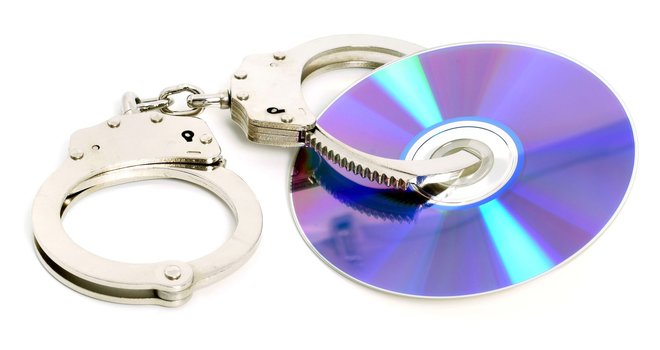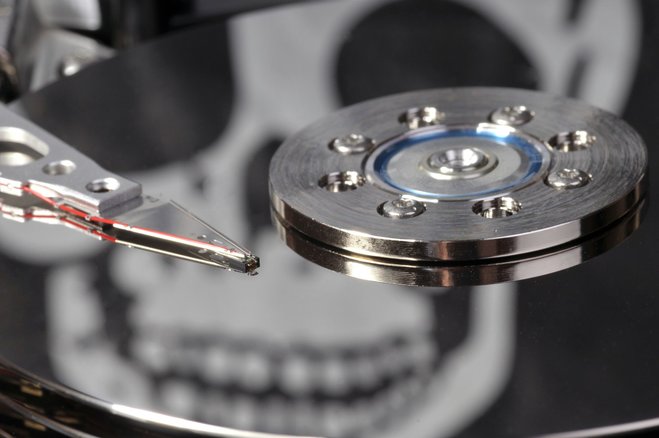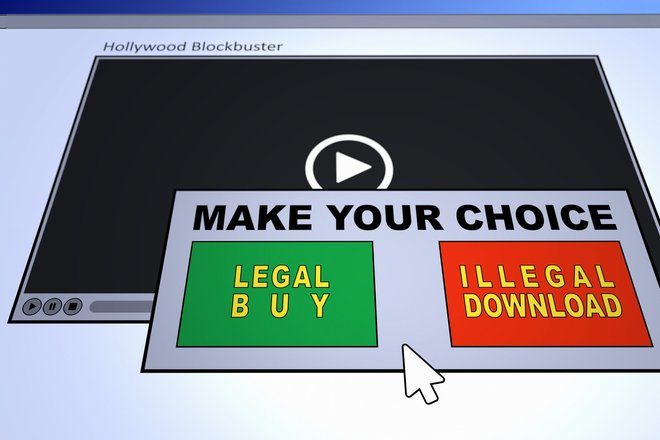Recently, when the news that the much-praised copy protection for Ultra HD Blu-ray had been cracked made the rounds, it likely brought a smirk to the face of many readers. For too long, users had listened to the industry that touted every new format as uncrackable - usually followed by pirated copies within a few days or weeks. Alas, this eternal game of The Tortoise and the Hare is only funny until you're personally affected - after all, it's the honest buyer that's left holding the bag.

It was a beautiful day. I wanted to head down to the beach and was very much looking forward to the drive. A new CD was supposed to provide the soundtrack while I raced down the Autobahn. As the disc slowly disappeared into the player, I waited for the first guitar chords and got - nothing. Aside from the confused mechanism and several attempts at playback, there was total silence. Furiously glancing through the booklet, I found a tiny, almost microscopic note - the disc was copy-protected. When later that day the drive in my PC also failed to recognize the disc, I swore I'd never buy a copy-protected CD again!
The interesting side effect was that I was forced to look for software on the Internet that would finally play the disc. Before I knew it, I had one foot in jail already. In the US, it has been illegal to provide software capable of circumventing copy protection since 1992. Germany followed suit in 2003 though serious legal trouble likely only ensues once you start distributing your own cracks or pirated copies. Still, knowing you might get into trouble doesn't leave a good taste in your mouth. Besides, it forces regular users to visit Internet pages they'd never look up otherwise and these offer far more than harmless software players for lawfully purchased discs, plus a few viruses here and there as an unwanted bonus.
 Meet the pirates!
Meet the pirates!
In another case, I wanted to install an old golf game and discovered the copy protection wasn't compatible with Windows 7 - but the actual game was. In these instances, you're forced to crack the game (circumvent the copy protection) to play it. How bizarre. As customers, we can't help but feel we're given inferior, buggy products. In part, these errors are deliberately introduced during production. Take Sony's ARccOS copy protection technology. It relies on bad sectors that are added to DVDs to prevent copying as ordinary drives will try to fix them during the reading process and will thus create error-free but flawed copies. Knowing that thousands of users that owned Xboxes, Toshiba or in same cases even Sony players would be left out from the start didn't stop them either.
The only users who didn't have any issues were members of the digital underworld and it didn't take them long to circulate pirated copies of any and every disc. Even ordinary (resourceful) Linux users simply took programs like "ddrescue" to create 1:1 copies. Others found a way to remove both the bad sectors and the copy protection to create unprotected discs playable in any player. That sounds exactly like what you'd expect from a purchased disc. Physical copy protection not only made copying but also playing the discs in drives from various different manufacturers much harder if not impossible. If you're thinking that's the end of it you've got another thing coming - now we're getting to the software side...
 Some decisions are made extra hard
Some decisions are made extra hard
There's an ongoing battle against illegal software distribution that has led some developers to install special low-level system drivers. If these drivers are unstable or don't play well with other drivers, you're entire system will be at risk of becoming insecure or unstable. It's important to remember it's not the game that is dangerous, it's the copy protection. Comprehensive updates like the recent Windows 10 Creators Update can always introduce unforeseeable incompatibilities with existing copy protection schemes that, if worse comes to worst, cause your once perfectly fine system to blow up in your face. And then there are installers that check your machine for virtual drives and simply refuse to continue unless you uninstall said drives, even though you might have a perfectly good reason for having them. It's outrageous! The presence of virtual drives alone is no sure indication of your intent to circumvent copy protection.
How I long for the days when copy protection only meant you had to type in a couple of codes from a code sheet that came with games like "Zak McKracken". These sheets were simply colored in a way that made it impossible to photocopy them - which is why they had us manually copy every line and curse at this most rudimentary of copy protections.
What I would like to know: have you experienced any issues with products because of their copy protection? Would you uninstall software because the copy protection of another product tells you so?




This copyright issue is more trouble than it is worth. Let me explain. We have LG DVD recorders, with built in Copyright circuits, which prevent any copying of Copyrighted DVD's, which you would say is reasonable to do, right? Now comes the fun part - every time our neigbours use their Mobile phones, our DVD recorder stops the decording, with a message: "Copyright signal detected" It can happen any time of the day or night, and it is worse, when it happens in the middle of a very important program. The machine will not allow you to continue recording up until the neighbours finished their conversation on their 2.4GB mobile phones. I would love to tear that part of the circuit out of an otherwise beautiful DVD Recorder.(If I knew how???)
All the music you could ever need?
Join Spotify and buy a copy of Sidify.
It's worth the subscription.
I can remember in my younger days when artists like Celine Dion released cds that were copy-protected. The intention being, as stated in the article, that you shouldn't copy them. Unfortunately, the copy-protection also caused youngsters who only used their computers for playing music suddenly couldn't play the cds they had just paid for.
This caused a lot of negative press, and certainly wasn't worth the hassle.
Nowadays, in a time of digital streaming we don't have these issues anymore, but they are still quite sad when thinking that the very protection used can also adversely affect your very (paying) clients...
Well, First of all, I never copied software, music, games, Videos! etc, To Sell! EVER! But I did brake copy protection to make my own backup copies of software that I bought! As most software protection disks ether never work correctly at all! Or fail at some point! Or cause any number of problems to CD-DVD Read-writers sometimes to the point that they are not reparable! I would copy stuff I payed for and put it on a CD or DVD so that I could use it with NO Problems or damage to my Computers! Now if something, Music CD's or Movies! has what I consider "BAD" copy protection I do not Buy it to start with! I don't need it! Most DVD's are easy! with all the copy stuff you can copy movies to your SSHD or anything and Burn it back to DVD at any point and watch it with no problems at all! Most Music can be played and recorded at the same time from any number of radio web sites and can be put on CD to play in my car when ever I want! But! Like I said! This is for MY and my immediate family ONLY! They are backups of data that I paid for! I have a right to protect my investment Period! Games? that is just dumb! I don't wast my time! Play-station and others are so cheep most of the time I just buy them! I want the play book anyway! If a new game is too much wait a few months and you will get it for less then half the retail price! ETC. DOOM! the new one! was over $60.00 Dollars! I listed it in my wish list on Steam! in less then a month I was able to buy the game legally with the codes from the dealer for $19.00 Dollars! on sale! Its just NOT worth it! especially to make copies and try to sell them! Your not going to make enough money to pay for your time in Jail! My $00.2 &1/2 cents worth! Take Care, Always Have FUN!
My Ashampoo Anti Virus has just been excluded I suppose Ashampoo will try to help out when they get to know. So I conclude that we are getting the same sort of problem accessing a program within Windows 10. If The Gates of Microsoft are closed for some reason ...we get summarily robbed. Who cares ....the default position is .....don't bother looking chum because you're on yer own....
That is the case where I live ....the authorities only pretend to be there for us. We don't even have our own government. but I don't suppose you on the Continent have ever noticed ...we were invisible...until the referendum...
What is the software manufacturers opinion they must be more aware of this problem than we are. But this software industry business is a closed shop like so much else and it's very rare that we ever do find out...
With their recent update, Microsoft has given us a few puzzles to solve. We’re already working on a solution.
Only had one incident where I purchased a DVD to be greeted with a screen message "you do not have rights to play this DVD". It promptly turned off the DVD player connected to a TV monitor. (I don't watch TV)
It played on my PC without any problems. I returned it and took an identical one in return. It played on both devices without a pop-up screen. Don't get me started on the number of CDs that will not play on my CD player in the auto.
I had so many problems with copy protected material that I no longer by copy protected discs.
I bought Amazon Prime (I save the annual subscription on the free delivery part of the deal plus use a Firestick for Amazon TV) and pretty much exclusively buy my music online from them. All purchased CDs (or individual tracks) are downloadable to your machine as MP3 files - I just burn the album to disc or make a compilation of tracks to suit my mood. OK not perfect if you can distinguish between MP3 and full fat audio (CDDA) but a pretty good arrangement for not having to worry about copy protection.
Under Australian Consumer Law, if I got one of these, I could demand a refund as it was not "fit for purpose" or "not of merchantable quality". I would assume that most other (civilized) countries have something similar.
Walking around seeing natural trees, plants, flowers and bushes, looking at animals and other creatures in their natural habitat are the few normal pleasures left in life, everything else is tied up in Stacheldraht !!
I don't understand the opening to this piece. Copy protection doesn't stop a disc playing in a CD player, that's why you bought it.
As far as copying DVDs, I have heard that software called 'DVDfab' will copy anything, protected or otherwise.
Is this true?
Hi Graham,
there have been cases in which copy protection on retail audio CDs was incompatible with CD players so the discs weren't recognized.
...agree with Brian;
My personal stance is copy protection is really a fraudulent method of controlling the use of a sub-standard product; as we all know, these products further require the user to absorb their highly inappropriate justification of their 'rules of obeyment'.
I've not had any deadend personal experiences with copy protection, but would spew if I'd paid money then was unable to use it.
Your assertion Sven "...we can't help but feel we're given inferior, buggy products..." is something I think is a much more serious issue. We KNOW we're buying and subscribing to inferior products, often being used as beta testers between updates, patches and bug fixes, and there's nothing we can do to subvert these questionable practices.
Don't we all miss SLYSOFT ANYDVD and CloneDVD
yes copy protection is for the birds .I try not to buy them with copy protection but like others ,I would look on line to find away to make it work
Sony CD protection could be bypassed with a sharpie...just draw over the outer edge and your drive would just skip past till it can read the actual music.
Millions of research and implementation defeated by $1 marker. It just made me smile.
The protection on digital music also had unintended consequences where the music player would get shorter battery life due to extra processing to decrypt the file before playing.
I don't mind companies try to protect their product but not at the expense of honest users' experience. What's the point of paying for entertainment if you can't use it with ease?
Locks only keep honest people out.
There was the famous incident of a copy protected CD that actually locked the computer drive if you tried playing it. Not too bad for PC owners who could extract it with a piece of wire, but a disaster for Macintosh users who had to bring the machine to a service agwent to get access to the CD drive again
No, I would return offending dvd. AND if they refuse to take it back,
I would have no choice , but to go internet and find a way to fix it. no choice really.